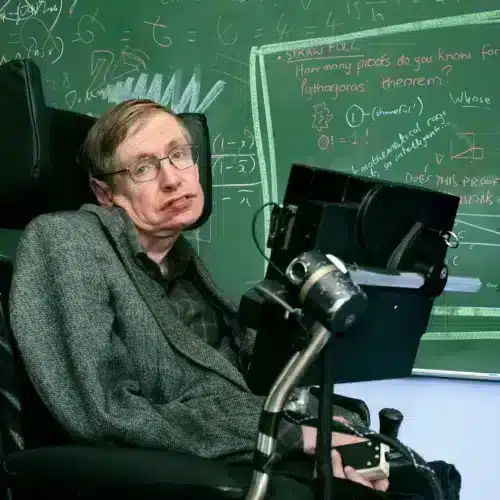Stephen Hawking: Unraveling the Mysteries of the Universe

Stephen Hawking (8 January 1942 – 14 March 2018) was a renowned theoretical physicist, cosmologist, and author who made groundbreaking contributions to our understanding of the universe.
Life and Career
He was born on 8 January 1942 in England and studied physics at the University of Cambridge. In Highgate, London, Hawking attended Byron House School. He later blamed the school’s “progressive methods” for his failure to learn to read. Hawking attended St Albans High School for Girls for a few months when she was eight years old.
Hawking began his university education at University College, Oxford, in October 1959 at the age of 17 years old. During Hawking’s doctoral studies, there was considerable discussion in the physics community regarding the prevailing theories concerning the creation of the universe: the Big Bang theory and the Steady State theory. Based on Roger Penrose’s theorem of a spacetime singularity in the center of black holes, Hawking wrote a thesis on this topic in 1965. As a result of his experiments, he proposed the revolutionary theory that space and time originated from a singularity, a point that is both infinitely small and dense, best known for being the key characteristic of black holes. In that same year, Hawking was accepted as a fellow at Cambridge’s Gonville and Caius College – his academic home for the rest of his life. As a result of Hawking’s obsession with black holes, he discovered that particles could escape black holes in 1974. This theory coined the term Hawking radiation is widely considered his most significant contribution to physics. Hawking passed away on 14 March 2018 in 2018 at the age of 76.
Award and Legacy
Stephen Hawking was the recipient of numerous awards and honors throughout his career, including the Presidential Medal of Freedom, the highest civilian award in the United States. He was also awarded the Companion of Honour by Queen Elizabeth II and the Copley Medal, the oldest and most prestigious scientific award in the world.
In addition to his scientific contributions, Hawking was also known for his wit and sense of humor, and he used his fame to promote science and education. He was a vocal advocate for the importance of understanding the universe and the role that science and technology can play in improving the world.
Hawking’s groundbreaking research on black holes led Cambridge to appoint him as the Lucasian Professor of Mathematics, a position held by Isaac Newton in 1669. In 2017, Hawking’s doctoral thesis was made available on a University of Cambridge website that crashed due to an overwhelming amount of traffic.
Hawking’s work had a profound impact on our understanding of the universe and will continue to be remembered for generations to come. On 8 January 2022, Google Doodle celebrated Stephen Hawking’s 80th birthday.
Observer Voice is the one stop site for National, International news, Sports, Editor’s Choice, Art/culture contents, Quotes and much more. We also cover historical contents. Historical contents includes World History, Indian History, and what happened today. The website also covers Entertainment across the India and World.

